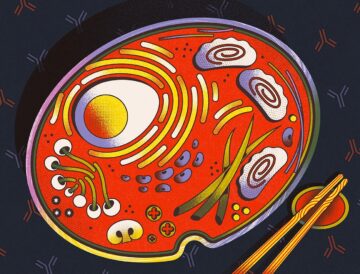Nic Fleming in Nature:
 Reboot your immune system with intermittent fasting. Help your ‘good’ bacteria to thrive with a plant-based diet. Move over morning coffee: mushroom tea could bolster your anticancer defences. Claims such as these, linking health, diet and immunity, bombard supermarket shoppers and pervade the news. Beyond the headlines and product labels, the scientific foundations of many such claims are often based on limited evidence. That’s partly because conducting rigorous studies to track what people eat and the impact of diet is a huge challenge. In addition, the relevance to human health of results from studies of animals and cells isn’t clear and has sometimes been exaggerated for commercial gain, feeding scepticism in nutrition science.
Reboot your immune system with intermittent fasting. Help your ‘good’ bacteria to thrive with a plant-based diet. Move over morning coffee: mushroom tea could bolster your anticancer defences. Claims such as these, linking health, diet and immunity, bombard supermarket shoppers and pervade the news. Beyond the headlines and product labels, the scientific foundations of many such claims are often based on limited evidence. That’s partly because conducting rigorous studies to track what people eat and the impact of diet is a huge challenge. In addition, the relevance to human health of results from studies of animals and cells isn’t clear and has sometimes been exaggerated for commercial gain, feeding scepticism in nutrition science.
In the past five or so years, however, researchers have developed innovative approaches to nutrition immunology that are helping to close this credibility gap. Whereas nutrition scientists have conventionally studied the long-term impacts of loosely defined Mediterranean or Western diets, for example, today they have access to tools that allow them to zoom in on the short-term effects — both helpful and harmful — of narrower food groups and specific dietary components, and to probe the molecular mechanisms underpinning the effects of foods on immunity.
More here.
Enjoying the content on 3QD? Help keep us going by donating now.
